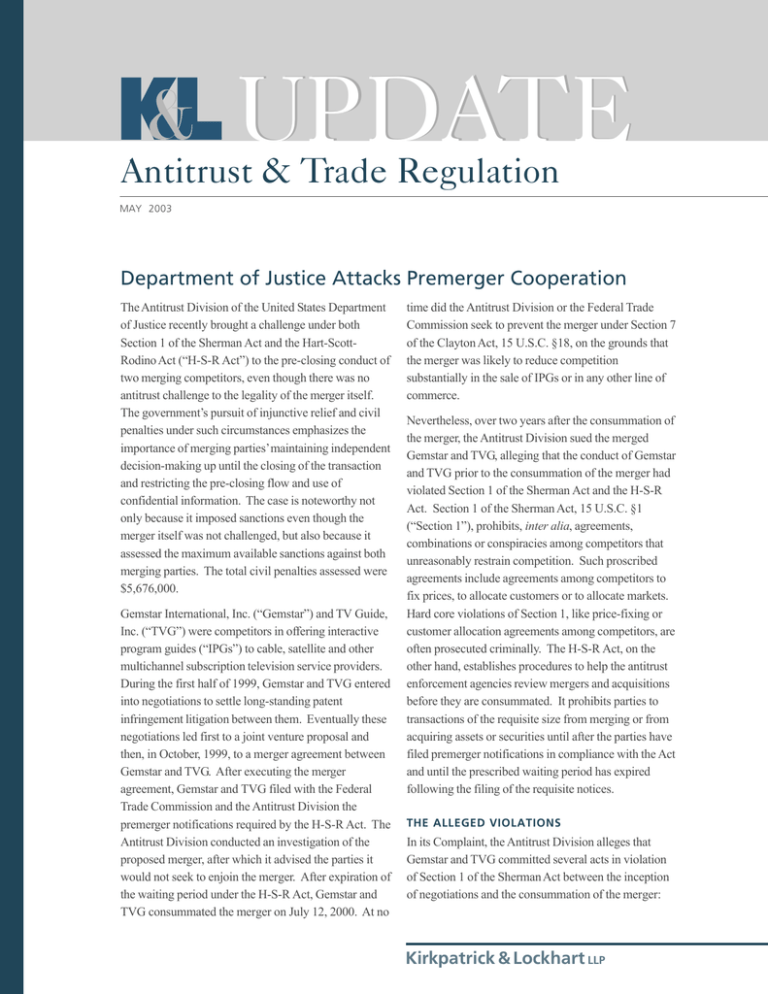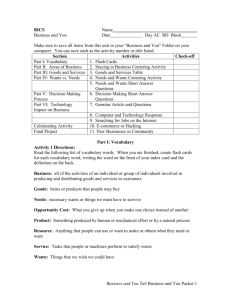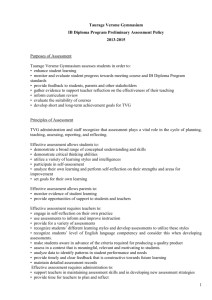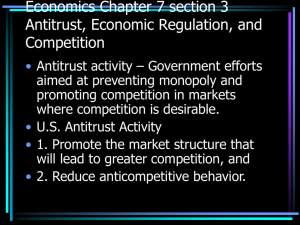
UPDATE
Antitrust & Trade Regulation
MAY 2003
Department of Justice Attacks Premerger Cooperation
The Antitrust Division of the United States Department
of Justice recently brought a challenge under both
Section 1 of the Sherman Act and the Hart-ScottRodino Act (“H-S-R Act”) to the pre-closing conduct of
two merging competitors, even though there was no
antitrust challenge to the legality of the merger itself.
The government’s pursuit of injunctive relief and civil
penalties under such circumstances emphasizes the
importance of merging parties’ maintaining independent
decision-making up until the closing of the transaction
and restricting the pre-closing flow and use of
confidential information. The case is noteworthy not
only because it imposed sanctions even though the
merger itself was not challenged, but also because it
assessed the maximum available sanctions against both
merging parties. The total civil penalties assessed were
$5,676,000.
Gemstar International, Inc. (“Gemstar”) and TV Guide,
Inc. (“TVG”) were competitors in offering interactive
program guides (“IPGs”) to cable, satellite and other
multichannel subscription television service providers.
During the first half of 1999, Gemstar and TVG entered
into negotiations to settle long-standing patent
infringement litigation between them. Eventually these
negotiations led first to a joint venture proposal and
then, in October, 1999, to a merger agreement between
Gemstar and TVG. After executing the merger
agreement, Gemstar and TVG filed with the Federal
Trade Commission and the Antitrust Division the
premerger notifications required by the H-S-R Act. The
Antitrust Division conducted an investigation of the
proposed merger, after which it advised the parties it
would not seek to enjoin the merger. After expiration of
the waiting period under the H-S-R Act, Gemstar and
TVG consummated the merger on July 12, 2000. At no
time did the Antitrust Division or the Federal Trade
Commission seek to prevent the merger under Section 7
of the Clayton Act, 15 U.S.C. §18, on the grounds that
the merger was likely to reduce competition
substantially in the sale of IPGs or in any other line of
commerce.
Nevertheless, over two years after the consummation of
the merger, the Antitrust Division sued the merged
Gemstar and TVG, alleging that the conduct of Gemstar
and TVG prior to the consummation of the merger had
violated Section 1 of the Sherman Act and the H-S-R
Act. Section 1 of the Sherman Act, 15 U.S.C. §1
(“Section 1”), prohibits, inter alia, agreements,
combinations or conspiracies among competitors that
unreasonably restrain competition. Such proscribed
agreements include agreements among competitors to
fix prices, to allocate customers or to allocate markets.
Hard core violations of Section 1, like price-fixing or
customer allocation agreements among competitors, are
often prosecuted criminally. The H-S-R Act, on the
other hand, establishes procedures to help the antitrust
enforcement agencies review mergers and acquisitions
before they are consummated. It prohibits parties to
transactions of the requisite size from merging or from
acquiring assets or securities until after the parties have
filed premerger notifications in compliance with the Act
and until the prescribed waiting period has expired
following the filing of the requisite notices.
THE ALLEGED VIOLATIONS
In its Complaint, the Antitrust Division alleges that
Gemstar and TVG committed several acts in violation
of Section 1 of the Sherman Act between the inception
of negotiations and the consummation of the merger:
Kirkpatrick & Lockhart LLP
■
■
■
As part of their joint venture discussions, Gemstar
and TVG allegedly agreed to slow down or “slow
roll” their respective negotiations with two customers
for whose business they were at the time competing.
The slow roll was intended to permit the prospective,
combined operations of Gemstar and TVG to enter
into agreements with these customers on terms that
were agreed upon by Gemstar and TVG.
Negotiations with these customers were allegedly
postponed until after the merger was consummated.
Upon execution of the merger agreement and prior to
closing, competition between Gemstar and TVG
generally ceased pursuant to an understanding that
Gemstar would phase out its marketing of IPGs to
cable and direct broadcast service providers in favor
of licensing IPGs to OEM electronics manufacturers,
while TVG would continue marketing to cable and
direct broadcast providers.
■
■
■
■
Within days after reaching the agreement to merge,
Gemstar and TVG allegedly agreed between
themselves which one would approach specific
customers during the interim between execution of the
merger agreement and consummation of the merger.
■
■
■
Further, after reaching the agreement to merge,
Gemstar and TVG agreed upon the prices and other
principal terms that would be incorporated in the
proposals to service providers in the interim period.
The terms that they agreed would be used in the
interim period were the same ones the parties
proposed to offer after consummation of the merger
and differed materially from those TVG had
previously been offering.
TVG and Gemstar in the interim period shared
detailed and specific information about the terms that
they would offer to service providers and kept one
another apprised of the status of individual contracts
with service providers. TVG, for instance, provided
its draft contracts to Gemstar and received from
Gemstar detailed comments on proposed changes.
■
2
TVG acted as Gemstar’s agent in negotiating with
service provider customers, informing the customers
that it was acting as Gemstar’s agent.
TVG used its goodwill with an equipment manufacturer
to negotiate a settlement of litigation between Gemstar
and the manufacturer, even though certain terms of the
settlement would have precluded TVG from competing
for business with the manufacturer if the merger failed
to close.
TVG and Gemstar shared confidential information
regarding their pricing and capabilities for advertising
space on IPGs, met jointly with consultants hired by
TVG to develop marketing and pricing strategies and
discussed the optimum prices and capacity for their
IPG advertising business.
During the interim period, TVG and Gemstar shared
information and acted jointly with respect to numerous
business opportunities.
Gemstar shut down many of its competitive marketing
operations, shared substantial amounts of confidential
information with TVG and shared business
opportunities, effectively merging their operations prior
to closing the transaction with TVG. TVG thereby
allegedly acquired substantial control over Gemstar’s
business of providing IPGs to service providers.
THE AGREED REMEDIES
Gemstar and TVG consented to a final judgment that
prohibits antitrust violations and imposes substantial civil
penalties. To remedy the Section 1 violations, the
defendants agreed to the following relief:
■
The Antitrust Division also alleges that the actions of
Gemstar and TVG in the interim between the execution
of the merger agreement and the expiration of the HartScott-Rodino waiting period violated the H-S-R Act in
the following respects:
Gemstar allegedly acquired substantial operational
control over TVG’s business when TVG submitted
numerous marketing and sales decisions for review and
approval by Gemstar, including submission of draft
customer contracts, review of a customer’s request to
extend a pricing deadline and requests for guidance on
responding to customer counterproposals.
An injunction prohibiting Gemstar and TVG from
entering into any agreement with a competitor from the
beginning of negotiations to the consummation or
abandonment of a transaction, if the agreement would
fix, raise, set, stabilize or otherwise establish prices or
the level of output for any product in which the parties
compete.
KIRKPATRICK & LOCKHART LLP ANTITRUST & TRADE REGULATION UPDATE
■
■
■
■
The parties are also prohibited, during the period
from the start of such negotiations to the
consummation of the transaction, from agreeing to
delay or suspend sales or marketing efforts with
respect to any product in which the parties compete
and from allocating markets or customers among the
parties.
An injunction prohibiting, in the interim between the
start of negotiations and the consummation of the
transaction, the disclosure or the receipt of
information or projections relating to future prices or
contract offers for products in which the parties
compete. Notwithstanding the foregoing, the
defendants may conduct or participate in reasonable
and customary due diligence, provided that (1) any
disclosure of confidential information relating to
future pricing or contract offers is reasonably related
to the receiving party’s understanding of the future
earnings and prospects of the disclosing party, and
(2) such disclosure occurs pursuant to a nondisclosure agreement that (a) limits use of the
confidential information to conducting due diligence
and (b) prohibits disclosure of any such information
to any employee of the recipient who is directly
responsible for the marketing, pricing or sales of
competing products.
An injunction permitting customers who signed
contracts with Gemstar or TVG from the inception
of the Gemstar-TVG negotiations to the
consummation date to terminate their contracts with
Gemstar or TVG.
The injunctive relief expressly permits the
defendants to enter into a transaction agreement that
requires a party to “operate in the ordinary course of
business” prior to closing and requires a party, prior
to closing, to “forego conduct that would cause a
material adverse change in the value of the business
or assets to be acquired.”
of the statutory waiting period, to refrain from
entering into any agreement with the other
contracting parties to combine, merge or transfer (in
whole or in part) any operational or decision-making
control over the marketing or distribution of any
product service or technology to be acquired in the
proposed transaction.
■
SAFEGUARDS
The fact that the Antitrust Division pursued substantial
civil penalties as well as injunctive relief in a case
where it conceded the legality of the underlying
transaction underlines the importance for all parties
contemplating mergers, acquisitions or joint ventures of
assuring that the parties continue to compete with one
another as usual until the transaction closes. In the
government’s view, it is only upon the consummation of
the transaction that consumers receive the benefit of the
efficiency-enhancing integration of the two former
competitors and, therefore, it is only after
consummation that the parties should be permitted to
eliminate the competition between them. In the
government’s view, until the transaction is
consummated, the two parties remain independent
competitors whose actions are subject to the regular
functioning of the antitrust laws. While the detailed
facts of each transaction need to be analyzed in detail,
many parties to merger, acquisition and joint venture
agreements are likely to adhere to the following types of
procedures in order to avoid possible liabilities under
Section 1 of the Sherman Act and the H-S-R Act in
connection with the negotiation and implementation of
such agreements:
■
To remedy the violations of the H-S-R Act waiting
period requirements, even though the merger itself
remains unchallenged, the agreed Final Judgment
provides the following remedies:
■
Gemstar and TVG agreed, during the period
between executing an agreement which requires
notification under the H-S-R Act and the expiration
MAY 2003
The merged company agreed to pay civil penalties of
$5,676,000. The amount of the penalty was
calculated by assessing against each of the
predecessor companies the statutory maximum of
$11,000 per day of violation.
■
Parties contemplating a merger, an acquisition or the
formation of a joint venture will maintain their status
as independent economic entities prior to closing by
continuing to act in the marketplace as they would
have in the absence of the contemplated transaction.
Parties to a proposed transaction will, in the period
preceding the closing, make independent decisions
on competitive actions like pricing, customer
Kirkpatrick & Lockhart LLP
selection and product development.
■
■
pricing activities. However, if they do so, they will
often wish to take affirmative steps to assure that the
planning for post-closing activities does not affect
pre-closing competitive decisions on such topics as
pricing, customer selection or product development.
In practice, insulating the parties’ day-to-day
decisions from the influence of planning for postclosing coordination may require that those involved
in such planning be isolated from ongoing business
decisions in the interim.
As a general rule, according to the Antitrust
Division’s Competitive Impact Statement relating to
the case, “competitors should not obtain prospective
customer-specific price information prior to
consummation of the transaction.”
Information that is not otherwise publicly available
may be disclosed between parties to the transaction
only to the extent that the disclosure is reasonably
necessary to permit the transaction to proceed.
■
— Where the disclosure by one party to another of
nonpublic information is reasonably necessary to
permit the proposed transaction to proceed, care
can be taken to assure that such disclosure does
not affect the parties’ competitive behavior prior
to closing.
■
— Special care will generally be taken with respect
to information regarding current or prospective
prices or terms of sale.
— Consideration will often be given to confining
access to the competing party’s sensitive pricing,
marketing and sales information only to an
outside consultant or, if and when company
personnel must have access, restricting access to
a “clean team” of company personnel who have
no involvement in the receiving company’s own
ongoing pricing, marketing and sales decisions.
■
During the interval between signing a transactional
agreement and closing the transaction, it is not in
itself unlawful for the parties to plan for
consolidated, post-closing, marketing, sales and
The parties to a proposed merger, acquisition or joint
venture generally should not, prior to closing, avoid
or suspend competing with one another.
The parties to a proposed merger, acquisition or joint
venture generally should not, prior to closing, adapt
their prices or other terms of sale to those of another
party to the transaction unless such a modification is
necessary to make the party modifying its prices or
terms of sale more competitive with the other party
to the proposed agreement (i.e., cutting prices to
meet or beat the other party’s terms would be
permissible, but raising prices in order to avoid
competing vigorously would not).
THOMAS A. DONOV
AN
DONOVAN
tdonovan@kl.com
412.355.6466
K&L’s Antitrust and Trade Regulation practice provides
comprehensive antitrust counseling to clients on achieving
business objectives while complying with the antitrust laws.
If you have any questions regarding the subject matter discussed
in this Alert, please contact one of the following attorneys:
James E. Scheuermann 412.355.6215 jscheuermann@kl.com
Thomas A. Donovan
412.355.6466 tdonovan@kl.com
Kirkpatrick & Lockhart LLP
Challenge us.
BOSTON
■
DALLAS
■
HARRISBURG
■
LOS ANGELES
■
MIAMI
■
NEWARK
■
NEW YORK
■
PITTSBURGH
■
SAN FRANCISCO
■
WASHINGTON
.........................................................................................................................................................
This publication/newsletter is for informational purposes and does not contain or convey legal advice. The information herein
should not be used or relied upon in regard to any particular facts or circumstances without first consulting with a lawyer.
© 2003 KIRKPATRICK & LOCKHART LLP.
ALL RIGHTS RESERVED.




